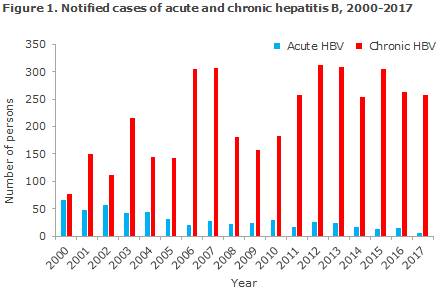No 10 - 2018
Hepatitis B, acute and chronic 2017
Boys who feel attracted to boys are not eligible for free HPV vaccination at their GP
Acute and chronic hepatitis B 2017
In 2017, the Department of Infectious Epidemiology and Prevention received six notifications of acute hepatitis B and 258 notifications of chronic hepatitis B.
For a detailed epidemiological account of the incidence in 2017, please see here
The number of notified cases of acute hepatitis B remains low, see Figure 1. The majority of the cases in this group were sexual transmissions. Even though the hepatitis B incidence is low in Denmark, it remains important to consider vaccination prior to travels to high-endemic countries if it is likely that the traveller will engage in unprotected sex with someone from the area, and if the traveller has a partner from a high-endemic country or is a man who has sex with other men, cf. the Danish Health Authority’s guideline on HIV, hepatitis B and C.

Prevention of sexual transmission of hepatitis B in Denmark needs to be focused on early tracing and risk-group diagnosing and on disseminating information among these groups about the routes of infection and the risk of transmission during sex and the option to achieve effective hepatitis B prophylaxis through vaccination.
The majority of cases of chronic hepatitis B were immigrants who were infected prior to their arrival to Denmark. Nearly half were notified as mother-to-child transmission, and the majority of the remaining cases were notified with unknown mode of transmission.
In 2017, a total of 78 pregnant women were notified with chronic hepatitis B. No children were notified as having been infected at birth in Denmark. Thanks to the screening of pregnant women for hepatitis B, every year sees the detection of a considerable number of asymptomatic carriers who must be referred to a specialist department (infectious medicine or gastro-medicine) for further work-up, control and treatment, if relevant. This is important, not least because today it is possible to treat pregnant women with a high viral load who would otherwise have a considerable risk of inter-uterine infection of their child.
Children born by hepatitis B-positive mothers shall be given immunoglobulin and vaccine at birth (so-called post exposure vaccination) and when they are 1 month (e.g. at the 5-week examination), 2 months and 12 months old to reduce their risk of mother-to-child transmission during labour.
In a limited number of cases, post-exposure will not prevent mother-to-child transmission. It is therefore recommended that children born by mothers who have hepatitis B be tested for hepatitis B to determine their status and the vaccination effect 1-2 months after they have concluded their hepatitis B vaccination. A blood sample is taken to test for quantitative anti-HBsAg, HBsAg and anti-HBc. This is done at the child's GP.
Unknown source of transmission is often mother-to-child transmission
Since year 2000, more than 3,500 persons of non-Danish origin have been notified with chronic hepatitis B in Denmark. In the majority of these cases (60%), the mode of transmission is mother-to-child transmission, but more than 30% of the notified cases are notified with unknown mode of transmission. Presumably, many of these cases are mother-to-child transmissions.
Among the ten most frequently stated countries of origin of foreigners notified with chronic hepatitis B in Denmark are: Vietnam, China, Somalia, Thailand and the Philippines. These countries have been classified by the WHO as high-endemic, which means that the prevalence of hepatitis B exceeds 8%. In countries where the hepatitis B prevalence is high, it is assessed that by far the most frequent mode of transmission is mother-to-child transmission. Therefore, it is expedient to state mother-to-child transmission when a person from one of the mentioned countries tests positive to hepatitis B, unless there are strong indications of another mode of transmission. This will enhance the quality of the hepatitis B monitoring.
All of the notified adoptees were from India, South Korea or Vietnam.
Testing persons from high-endemic countries is still recommended, regardless of their sex, at their first contact with Danish healthcare. This recommendation includes adoptees.
(M. Wessman, S. Cowan, Department of Infectious Epidemiology and Prevention)
Boys who feel attracted to boys are not eligible for free HPV vaccination at their GP
On 1 February 2018, the Danish Health Authority launched a temporary offer of free HPV vaccination for 15-20-year-old boys who feel attracted to boys, EPI-NEWS 4/18. The boys are not eligible for free vaccination at their GP, but can be vaccinated at the AIDS Foundation’s clinics.
(The Danish Health Authority)
Link to previous issues of EPI-NEWS
7 March 2018